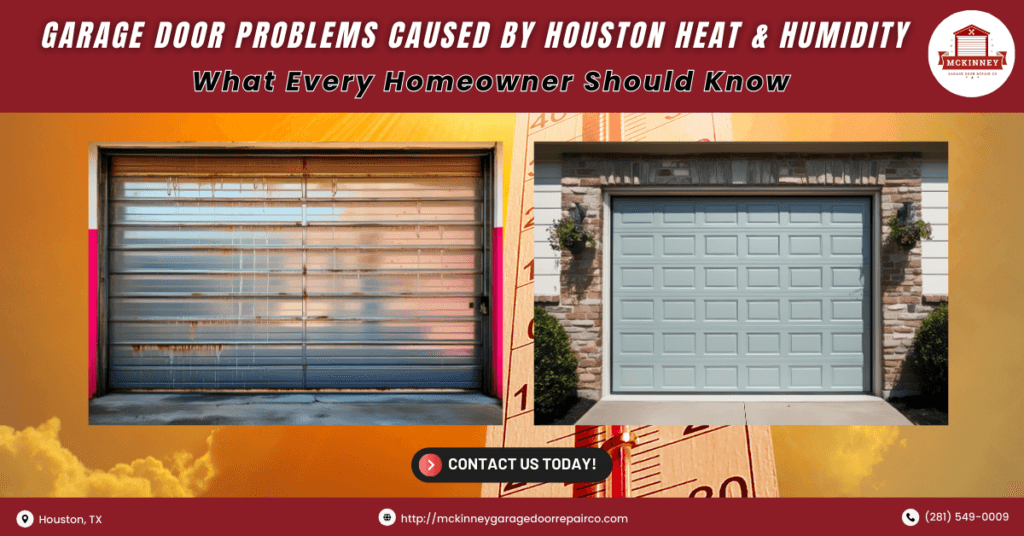
Ever notice your garage door acting up more during Houston’s sweltering summers or after a sudden downpour? You’re not imagining it. Houston’s climate is brutal on garage doors, and if you don’t know what to look out for, you could be heading for a costly repair—or worse, a complete system failure.
At McKinney Garage Door Repair Co., we’ve spent years helping homeowners across Downtown, The Heights, and even near Minute Maid Park understand how the local climate affects their garage doors. Whether you’re dealing with rusted springs, a misaligned track, or uncooperative sensors, this guide will help you spot the signs early and take action.
Let’s break down how Houston weather messes with your garage door—and what you can do about it.
Why Houston Weather is Hard on Garage Doors
Houston isn’t just hot—it’s hot and humid, with spontaneous storms that can flood streets and basements within minutes. It’s no wonder garage doors take a beating. Here are the top weather-related culprits:
1. Spring Failure Due to Heat Expansion
Garage door springs are coiled under intense tension. In Houston’s 95°F+ summer days, the metal expands repeatedly, weakening the spring over time. Eventually, they snap or stretch to the point of uselessness.
PRO TIP: If your door suddenly feels heavy or slams shut, you probably have a spring issue.
2. Humidity = Rust & Corrosion
High moisture in the air doesn’t just make us sweat—it creates a perfect environment for rust to develop on your garage door’s metal parts. Rollers, tracks, and hinges are especially vulnerable, leading to grinding sounds and sluggish movement.
A report from Angi notes that coastal climates increase the risk of rust buildup by over 30% compared to drier regions.
3. Sensor Malfunctions Post-Storm
Garage door sensors are sensitive to alignment and clarity. After heavy rains or a shift in your garage’s foundation (yes, Houston soil moves!), they can get knocked off or covered with debris. The result? Your door won’t close properly—or worse, keeps reversing.
4. Panel Warping from Moisture Swelling
Wood and vinyl garage doors can warp or swell due to the constant temperature swings and humid conditions. When the panel shape changes, it throws off the door’s balance and alignment, straining the opener and other components.
How to Weather-Proof Your Garage Door in Houston
Don’t worry—your garage door can stand up to Houston weather with a bit of care and regular checkups. Here’s how to protect your investment:
1. Schedule Bi-Annual Tune-Ups
We recommend scheduling residential garage door repair or maintenance checks at least twice a year, especially before summer and after hurricane season. We’ll inspect and lubricate all moving parts, tighten hardware, and check for weather-related damage.
2. Use Weather-Resistant Lubricants
Standard WD-40 won’t cut it in Houston. Use silicone- or lithium-based lubricants that can stand up to extreme temperatures and moisture. Focus on rollers, springs, hinges, and tracks.
3. Replace Worn-Out Seals
The weather seal at the bottom of your garage door helps block out water, dirt, and hot air. If it’s cracked or brittle, replace it ASAP to avoid damage to your garage flooring or insulation.
4. Clean and Test Sensors Monthly
Wipe down your sensors with a dry cloth and make sure they’re aligned. Test them by placing an object in the door’s path—if it doesn’t reverse, it’s time for a garage door opener repair.
“Why Won’t My Garage Door Close After It Rains?”
Great question—and we hear it a lot. After a Houston storm, your sensors might be dirty, misaligned, or have moisture inside the wiring housing. Another culprit? Swollen panels or jammed tracks caused by humidity.
If you’re near Rice Village, Memorial Park, or EaDo, we can usually get someone out for emergency garage door repair the same day.
Real Feedback from a Houston Homeowner
“After the last storm, our garage door wouldn’t close at all. We were panicking—our garage is our main entry. McKinney Garage Door Repair Co. came out within two hours, fixed the issue, and even showed us how to clean the sensors ourselves. Honest, fast, and super friendly!”
— Daniel M., West University Place
FAQ: Houston Garage Door Troubles
Q: How can I tell if my garage door spring is going bad?
A: If your door suddenly feels heavy, slams down, or you hear a loud bang from the garage, your spring is likely broken.
Q: Why do my garage door sensors randomly blink?
A: Likely due to humidity buildup or misalignment. Wipe them and make sure they’re pointed directly at each other.
Q: Should I repair or replace my garage door?
A: If your door is under 10 years old and the issue is isolated (like a faulty roller or spring), a repair is often best. For widespread warping, cracking, or recurring issues, we may recommend garage door installation.
Don’t Let Houston Weather Win—We’ve Got You Covered
Let’s face it—Houston’s weather isn’t changing anytime soon. But your garage door’s performance doesn’t have to suffer because of it.
From the hustle of Downtown Houston to the suburbs around Sugar Land and The Woodlands, McKinney Garage Door Repair Co. is here to help you beat the heat, the humidity, and those infamous Gulf Coast storms.
We specialize in:
- ✅ Garage door repair in Houston, TX
- ✅ Garage door opener repair
- ✅ Garage door installation
- ✅ Residential garage door repair
- ✅ Commercial garage door repair
- ✅ Emergency garage door repair
📞 Call us today or schedule your service online.
Don’t wait for your garage door to fail—let us keep it running smoothly, rain or shine.
